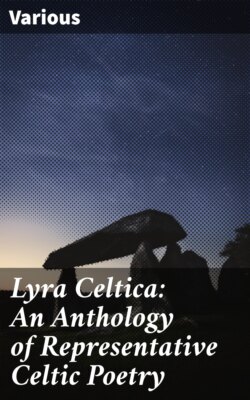Читать книгу Lyra Celtica: An Anthology of Representative Celtic Poetry - Various - Страница 4
На сайте Литреса книга снята с продажи.
Оглавление“In the highlands, in the country places,
Where the old plain men have rosy faces,
And the young fair maidens
Quiet eyes;
Where essential silence cheers and blesses
And forever in the hill-recesses
Her more lovely music
Broods and dies,
O to mount again where erst I haunted;
Where the old red hills are bird-enchanted,
And the low green meadows
Bright with sward;
And when even dies, the million tinted,
And the night has come, and planets glinted,
Lo, the valley hollow
Lamp-bestarred!
O to dream, O to awake and wander
There, and with delight to take and render,
Through the trance of silence,
Quiet breath;
Lo! for there, among the flowers, and grasses,
Only the mightier movement sounds and passes;
Only winds and rivers,
Life and death.”
Of course there is a certain poignant note common to all poetry, and he might be a zealous Celticist, but a poor worshipper of Apollo, who would try to limit this charm of exquisite regret and longing to Celtic poetry. It is an unfrontiered land, this pleasant country in the geography of the soul which we call Bohemia; and here all parochial and national, and even racial distinctions fall away, and Firdausi and Oisìn, Omar the Tentmaker and Colum the Saint, and all and every “Honey-Mouth” of every land and time, move in equal fellowship. Even in one of the most haunting quatrains by any modern Anglo-Celtic poet—
“O wind, O mighty melancholy wind,
Blow through me, blow!
Thou blowest forgotten things into my mind,
From long ago”—
we must not forget the elder music of one who is among the truest of the poets of Nature whom the world has seen: though neither in brain nor, so far as we know, in blood, had Wordsworth any kinship with the Celt—the music “Of old, unhappy, far-off things.”
By a natural association, “Ossian” comes to mind. It is pleasant to think that a book like “Lyra Celtica” appears just at the centenary of James Macpherson. Macpherson died in 1796, but long before his death his reputed “Ossian” had become one of the most vital influences in literature. This is not the occasion to go into the “Ossian” dispute. It must suffice to say that the concensus of qualified opinion decides—(1) That Macpherson’s “Ossian” is not a genuine rendering of ancient originals; (2) that he worked incoherently upon a genuine but unsystematised, unsifted, and fragmentary basis, without which, however, he could have achieved nothing; (3) that inherent evidence disproves Macpherson’s sole or even main authorship as well as “Ossian’s,” and that he was at most no more than a skilful artificer; (4) that, if he were the sole author, he would be one of the few poetic creators of the first rank, and worthy of all possible honour; (5) that no single work in our literature has had so wide-reaching, so potent, and so enduring an influence.
Much of the tragic gloom, of which “Ossian” is a true mirror, colours even contemporary Scoto-Celtic poetry; and though in Gaelic there is much humorous verse, and much poetry of a blithe, bright, and even joyous nature, the dominant characteristic is that of gloom, the gloom of unavailing regret, of mournful longing, a lament for what cannot be again. True, in a Gaelic poem by Mary Mackellar, a contemporary Highland poet, we hear of
Spioraid aosmhoir tìr nan Gàidheal,
Ciod an diugh a’s fàth do ’n ghàirich
’Dhùisg thu comhdaichte le aighear,
As an uaigh ’s an robh thu’d ’chadal?
(Spirit of the Gaelic earth
Wherefore is this mirth unwonted
That hath waked thee from the tomb,
And to triumph turned thy gloom?)—
but, alas! that fine line, “Spioraid aosmhoir tìr nan Gàidheal” is not an invocation to the Gaelic muse to arouse herself to a new and blither music, but is simply part of some congratulatory lines of a “Welcome to the Marquis of Lorne on his union with the Princess Louise”![2]
The “Spirit of the Gaelic earth” does not make for mirth, as a rule, at least in the Highlands, save in verse of a frankly Bacchanalian or satiric kind.
In this, there is a marked contrast with the Irish-Gaelic, whose muse is laughter-loving though ever with “dewy dark eyes.”
If, however, the blithe and delightful peasant poetry of Mr Alfred Percival Graves, and that so beautifully translated and paraphrased by Dr Douglas Hyde, be characteristically Irish, so also is such typically Celtic poetry as this lyric by the latest Irish singer, Miss Moira O’Neill—
